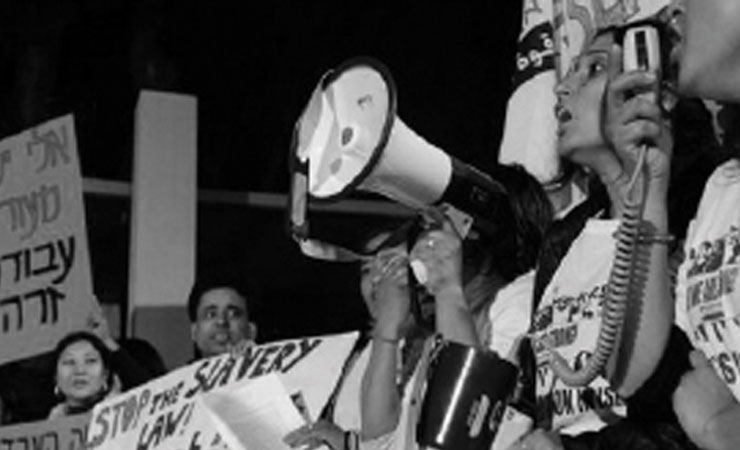By Noa Kaufman, Coordinator of Refugee and Asylum Seeker Workers
In 2012, Kav LaOved was approached by 15 women who lost their jobs whilst pregnant. All of these women live in the Gush Dan area, and were integrated in their communities enough to be aware of their right to challenge their illegal dismissal and approach Kav LaOved for assistance. We can only guess how many more pregnant women lost their jobs and thought they had no protection, and were consequently forced to bear the heavy hospital costs of their child’s birth. M’s story describes the obstacles faced by all asylum seekers and refugees in Israel, and adds the specific difficulties faced by this community’s women.
M is an asylum seeker from Eritrea, who escaped her homeland due to the oppression of its citizens by the ruling party – the only one permitted to operate under the country’s law – and the mandatory, indefinite, army service. When she arrived in Israel, M requested that the Ministry of Interior recognize her as a refugee. However, since Israel does not check asylum seeker requests made by Eritrean citizens and only grants them protection from deportation, she received a 2A5 type visa, on which it is stated that it is not a work visa.
Kav LaOved and fellow organizations previously turned to the High Court of Justice regarding this statement, and the Court eventually ruled that as long as the policy towards Eritrean asylum seekers remains as it is, authorities will not enforce sanctions against their employment. This leaves M, like thousands of other Eritreans, with a visa that makes it very difficult to find decent work, as well as being exposed to exploitation, while her employers are safe from fines. Luckily, in spite of these difficulties, M was able to find a job at a restaurant in the city where she resides. Although she had to work 10 hours a day, 7 days a week, without payment for overtime or social rights such as recuperation pay or vacation, she was still better off than most of her fellow asylum seekers and was able to financially support herself.
After nine months of work, M found out she was pregnant and informed her employer, the restaurant’s owner. Her employer chose to fire her, in spite of having full knowledge of the Women’s Work Law, which prohibits employers from the dismissal of employees for being pregnant. The consequences for a woman of no legal status in Israel are that the National Insurance Institute (NII) will not cover the costs of birth and hospitalization, which can amount to 15,000 NIS in the case of a standard birth (costs are much higher should any complications arise). Additionally, as she has no refugee status, she is prevented from her right to a birth grant to help her support herself during maternity leave, a right accorded by the UN Refugee Convention of which Israel is a signatory.
M’s story demonstrates how women in every society are among the first to be affected by social injustice. Because she was with child she was deprived of her source of income and thus lost her economic independence. If M didn’t have the awareness that the employer shouldn’t have dismissed her, and if the baby’s father had refused to pay the hospitalization costs, M would have had to pay a heavy price for giving birth to her own child.


